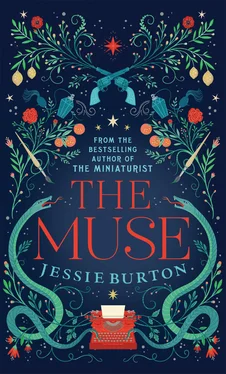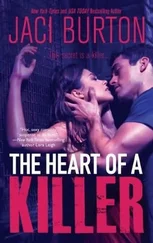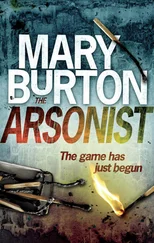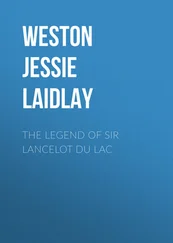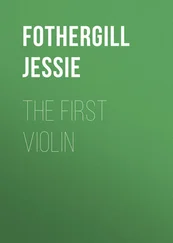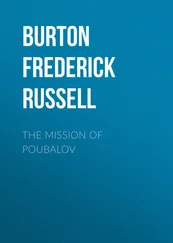‘I do?’ I found this immensely flattering and waited for Quick to go on, but her face clouded, and she broke the spine of the cigarette she’d left on the side of the ashtray.
‘What do you make of London?’ she asked. ‘You came in ’62. Do you like living here?’
I felt paralysed. She leaned forward. ‘Miss Bastien. This isn’t a test. I’m genuinely interested. Whatever you say, I won’t tell a soul. Cross my heart, I promise.’
I’d never told anybody this out loud. It may have been the gin, it may have been her open face, and the fact she didn’t laugh at my dream of writing. It may have been the confidence of youth, or that porter Harris, but it all came tumbling out. ‘I’ve never seen so much soot,’ I said.
She laughed. ‘The place is filthy.’
‘In Trinidad, we were brought up being told that London was a magic land.’
‘So was I.’
‘You’re not from here?’
She shrugged. ‘I’ve been here so long I can hardly remember anything else.’
‘They make you think London is full of order, and plenty, and honesty and green fields. The distance shrinks.’
‘What distance do you mean, Miss Bastien?’
‘Well, the Queen rules London and she rules your island, so London is part of you.’
‘I see.’
I didn’t think Quick did see, really, so I carried on. ‘You think they’ll know you here, because they also read Dickens and Brontë and Shakespeare. But I haven’t met anyone who can name three of his plays. At school, they showed us films of English life — bowler hats and buses flickering on the whitewash — while outside all we could hear were tree frogs. Why did anyone show us such things?’ My voice was rising. ‘I thought everyone was an Honourable—’ I stopped, fearing I’d said too much.
‘Go on,’ she said.
‘I thought London would mean prosperity and welcome. A Renaissance place. Glory and success. I thought leaving for England was the same as stepping out of my house and onto the street, just a slightly colder street where a beti with a brain could live next door to Elizabeth the Queen.’
Quick smiled. ‘You’ve been thinking about this.’
‘Sometimes you can’t think about anything else. There’s the cold, the wet, the rent, the lack. But — I do try to live.’
I felt I shouldn’t say any more; I couldn’t believe I’d said so much. The bread roll was in shreds upon my lap. Quick, in contrast, appeared totally relaxed. She sat back in her chair, her eyes alight. ‘Odelle,’ she said. ‘Don’t panic. It’s likely you’ll be fine.’
Cynthia married Samuel at Wandsworth Register Office, in a small room that smelled of bureaucracy and cheap perfume, with dark-green walls and steel chairs. Shirley and Helen, two girls from the shoe shop, came along in their finery. Sam’s friend from the buses, Patrick Minamore, was best man, and he brought with him his girlfriend Barbara, a fledgling actress and a talkative presence.
The registrar eyed us. The men were in suits, Patrick’s tie particularly loud — and everyone looked smart compared to the drab surround. Cynth was beautiful — I mean, she was beautiful anyway, even without love beaming through every inch of her, but in her white minidress, a simple white pill-box hat, and a pair of white shoes, given her by the manager, Connie, as a wedding present, she was radiant. She had a necklace of blue flowers made from ceramic, and two small pearls in her ears, so perfect and round, as if the oysters had made them especially for her.
Patrick, an aspiring photographer, was in charge of capturing us all. I still have some of those snaps. A fountain of rice caught mid-air, white rain upon Sam and Cynth’s laughing faces as they stand on the registry steps, their two hands lifted together as the grains cascade.
In marriage, at least, Cynth had triumphed. It was never going to be simple for us to find our way, and Cynth should have had a shoe empire by then, she was that good. It was not easy to sell shoes in Clapham High Street in 1967 as a Trinidadian girl. It was probably easier to write a poem about Trinidad’s flowers, send it to the British Consul and be rewarded with a prize. But at least she had Sam, and they had rubbed off well on each other — he serious and shy, she resourceful and determined — how her presence illuminated him as he signed his name in the register!
We went back to Sam and Patrick’s flat in black cabs, and told the taxi men that our friends had just got married. The drivers rolled down their windows and played the blues on the same radio station in concert, so loud we were terrified we’d get arrested for breaking the peace. Back in the flat, we lifted tea towels euphorically from sandwiches, found bottle openers, corkscrews, put a record on, and watched as they cut the white domed cake that Cynth had laced with rum.
After a couple of hours, other people turned up — friends of friends. Barbara had summoned up a gaggle of hip-looking folk, girls with long hair and short dresses, fellers in open-necked shirts, who looked like they needed a shave. I only glanced at them; I had long told myself those people were not for me and neither me for them. My back was damp with sweat and the ceiling seemed lower than it had been an hour ago. A couple of Barbara’s gang fell into a table, and a little red lamp with tassels tumbled to the floor. Though I’d never smoked it myself, I could smell the marijuana.
When the room was full, the mood was high and Cynth had drunk three Dubonnets and lemonade too many, she lifted the needle off the record player and announced, ‘My friend Delly is a poet and she wrote a poem about love.’ There was a cheer. ‘And she goin’ to read it now.’
‘Cynthia Morley, no ,’ I hissed. ‘Just ’cos you now a married woman, you can’t boss me around.’
‘Wha’ happen now, Delly?’ called Sam. ‘Why yuh keeping yuhself so secret?’
‘Come on, Delly. For me,’ said Cynth, to my horror drawing out the poem from her handbag as another, yet more unstable cheer rippled around the fuggy room. When I had finally showed it to her a week ago, like a schoolgirl walking the long route to the teacher’s desk, she had read it in silence and then put her arms around me tight, whispering, Good Lord, Delly, you truly blessed.
‘Is a very good poem, Delly,’ she said now, as she thrust it in my hands. ‘Come on, show these people what you have.’
So I did it. A little wobbly from my own Dubonnet, I glanced up only once at all the faces, small moons stopped for nothing else but me. I read my poem about love from the paper, although I knew it off by heart. My words made the room fall silent. And when I finished, there was more silence, and I waited for Cynth, but even she didn’t seem able to speak.
I did not see his face in the crowd when I read that poem. I did not feel his eyes on me, although he told me later he couldn’t drag them off mine. I felt nothing change in the room, except the shock of my voice alone and the peculiar euphoria one feels in the wake of applause, feeling at once cheapened and triumphant.
He came up to me about half an hour later, where I was in the minuscule and cluttered kitchen, stacking the empty foil plates in neat towers, trying to make some order out of Sam and Patrick’s bachelor chaos. ‘Hello,’ he said. ‘So you’re the poet. I’m Lawrie Scott.’
My first thought was to check whether there were bits of egg sandwich on my fingers. ‘I’m not a poet, I just write poems,’ I said, looking at my hands.
‘There’s a difference?’
‘I think there is.’
He leant against the counter, his long legs straight, crossing his arms like a detective. ‘Is your real name Delly, then?’ he said.
Читать дальше
